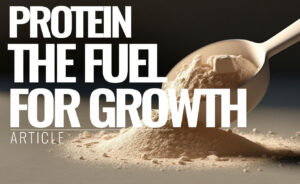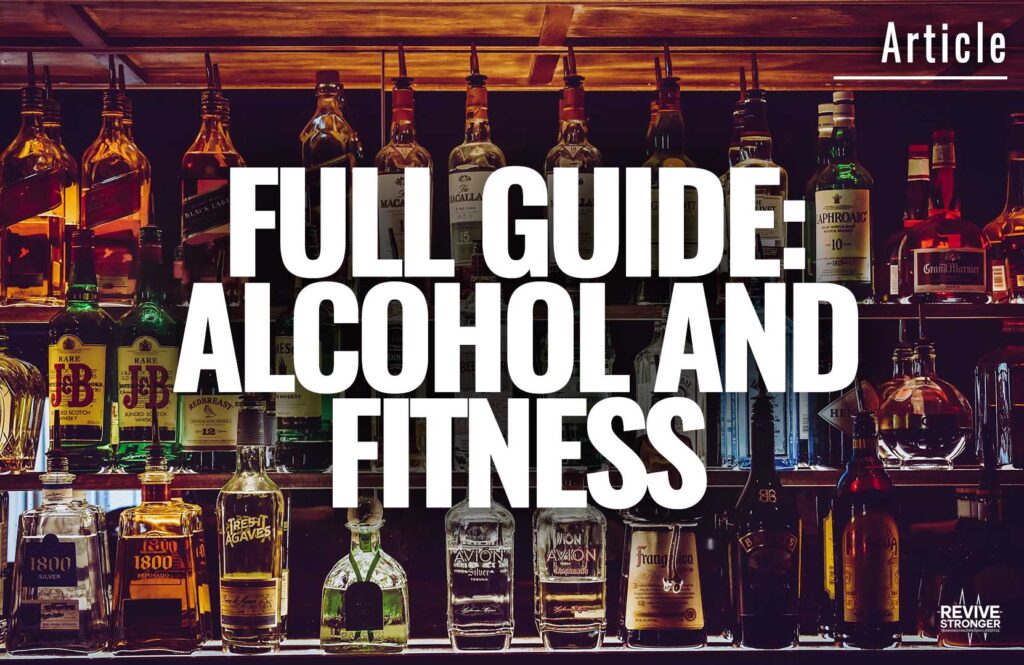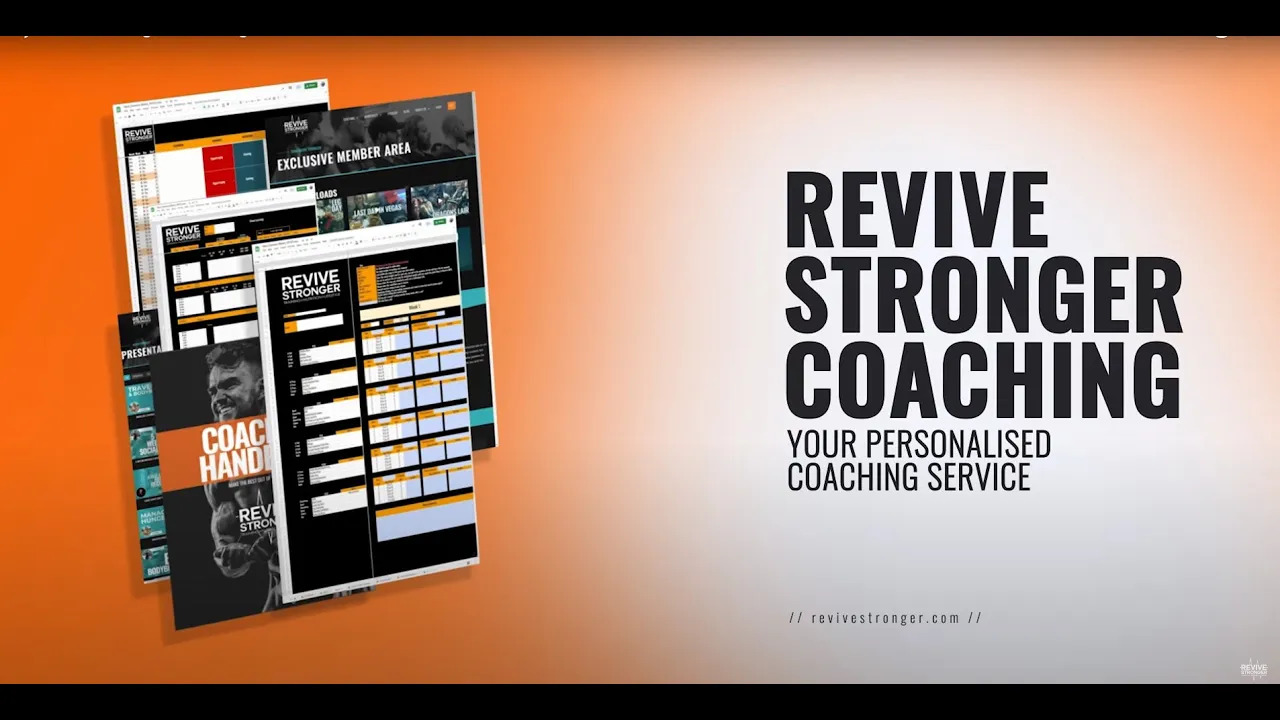
Revive Stronger
Full Guide: Alcohol and Fitness

So you like to have a tipple now and then but know it isn’t great for you.
Whether it’s the empty calories, the dehydration, the hangover, it’s just not ideal.
However, you’re not willing to give up going to the pub with your mates, having wine with your family or celebrating with some bubbly on a special occasion. I don’t blame you.
So you want to know how you can make it work, how you can find a balance, where you can enjoy some booze now and then, but also make sure you keep seeing results. Well you’re in luck, because today I am going to share with you the full guide to alcohol and fitness. Whether it be gaining muscle or losing fat, both can be done while enjoying your favourite beverage; whether it be an Ale, Wine, Spirits or Beer.
Table of Contents
Alcohol the Forgotten Macronutrient
People seem a bit unsure about where alcohol belongs in our diet, I think a lot of people think of it as a ‘free food’ and others think of it as carbs. In reality it is a macronutrient, that’s right in addition to your proteins, carbs and fats you also have alcohol. So I want to start this guide off with some quick fire facts about booze.
[bctt tweet=”Alcohol contains 7kcal per gram – but don’t worry you forget that pretty quick”]
Alcohol Facts:
- 7kcal per gram
- Examples:
- 330ml beer – 145kcal
- 5-oz glass of wine – 135kcal
- 1.5 oz spirits – 130kcal
- Not all the calories come from alcohol:
- Certain alcoholic drinks such as sweet wine, beer, cider and spirits with non-diet mixers contain additional calories in form of simple and complex carbohydrates. In such cases, the caloric content of a drink may be significantly higher than 100 kcal.
- Poor Quality Nutrition:
- Because alcohol doesn’t provide us with anything more than energy it isn’t the best source of nutrition, devoid of protein and lacking in micro-nutrition.
- Takes digestive priority:
- Ethanol (alcohol) is a xenobiotic product, which cannot be stored in the body but becomes rapidly oxidized (digested), displacing other fuels. So it has to be burned off before your body can use protein, fats or carbs.
- A Little is OK a lot is not:
- Alcohol has a J-shaped relationship between the amount of alcohol consumed and mortality. That means by drinking a little we actually see a decreasing mortality rate, but there is a point at which things turn for the worst, and every extra drop of alcohol increases our risk of mortality.
- In fact 4 out of 5 blue zones (areas in which the population live measurably longer lives) are regular alcohol consumers.
So in short from the above you should have learned that alcohol is very calorically dense (second to fat which has 9kcal per gram), it doesn’t provide our body with any sort of beneficial nutrition, it must be burnt off before our body can use any other macronutrient for fuel and that moderate intakes have been correlated with longevity but much more and it exponentially hurts our life expectancy.
[bctt tweet=”Alcohol is drank regularly by 4 of 5 Blue Zones”]
The problem seems to really be that people who consume a lot of booze are generally just less healthy people, and there is research to back this up. They don’t think about how many calories their bodies need, they don’t regularly take part in exercise, maybe they smoke and do other not so healthy things. So it isn’t the fact a little bit of booze is particularly good for you, it’s just that those who can exert moderation over it generally live healthier lives.
In addition studies have shown that men seem to be impacted to a greater degree than females. In that alcohol consumption and fat gain is more common in males than in females. The reasons aren’t 100% clear, but in Alan Aragon’s conference in 2014 he theorised it was down to the “Ah f*ck it factor”.
Men when drunk or thinking about drinking would just screw over their dietary habits, eat a load of junk food and greasy takeaway and that combination would see them put on fat. Whereas women wouldn’t do this, and often would skip meals because they were drinking. I can definitely relate to this, and I am sure you can too. Often I am shocked that my girlfriend will go straight out for drinks after work, because I’m like “when do you have dinner” and well, she doesn’t. That means men generally do not compensate for the extra calories they consume through booze, and even worse they actually eat more calories on top of the drink.
[bctt tweet=”The ‘ah f*ck it’ Factor got me, damn alcohol”]
For example Peter who is eating a diet of 2500 calories decides he is going for a night out with his mates. This is not a big night out, just some drinks with the lads, but what ends up happening is 4 Pints of Beer and then the lads decide to go get a kebab. So Peter has had around 700 calories from just beer, and then a kebab that could easily be 1000 calories. So that quiet night out ended up being over 1500 calories, and likely Peter had eaten pretty normally the rest of the day, having at least 1500 calories before going to the pub. Now this is a pretty non-extreme example, but here Peter has over-eaten by 500 calories.
On the other hand take Sarah, she is eating a diet of 1800 calories, and is going for a night out with her friends. Again not a big one, just a few drinks to catch up at the bar. Sarah has 4 glasses of wine and the girls call it a night, before going out Sarah ate a small breakfast and lunch, coming to 1000 calories. The 4 glasses of wine also came to around 700 calories, but because Sarah skipped the kebab she didn’t end up over eating. In fact Sarah still under-ate by 100 calories at the end of the day.
So what you should have learned from the above is that the trouble with booze comes when we do not consume it in moderation and we allow the “ah f*ck it” factor to take over.
My Experience with Alcohol
I have had a somewhat mixed relationship with booze. I had my first drink at around the age of 15, I think it was baileys…I didn’t like it. However, that same night I had a Malibu and Coke, which I did like (yes I know it’s a ‘girls drink’), and I also liked the effect it had on my head. Alcohol gave me confidence, and as a pretty un-confident teenager this was something I really liked.
However, this did lead to problems, because I didn’t drink moderately. I am very embarrassed of my past behaviour, which I am sure isn’t uncommon, but being sick in my sisters car was a bit of a turning point for me (also happened to be my 18th). After that happened, my dad had a real go at me, and I really had to think about my relationship with alcohol.
Then when at University I guess you could say I didn’t quite have the typical experience. In my first year I did go out and drink, but probably not as much as some. At Uni I did realise that booze really hampered my fitness progress, and I was big into running, rowing and did some weight training too. I also didn’t have a great relationship with food, I certainly was not a flexible dieter. So I tried to be moderate, but what happened was binges and then I would purge. Well not properly purge as I didn’t force myself to be sick, but I did force myself to do what I call ‘guilt cardio’.
After every night out I would do hours of cardio the next morning, to burn off the calories consumed in booze. I hated this feeling, I hated the cardio and I hated my relationship with alcohol. It was in my second year at uni when I had the accident that would change my life forever.
After this accident I was on a large water restriction, and was not allowed to drink any alcohol. From that point till my full recovery about 2 years later I was Teetotal. My accident actually completely changed my life, in the long run it was good, but in the short-term it sucked, big time. While Teetotal I found myself not going out and I would miss social events, because I couldn’t drink. If I did go people would try to pressure me into drinking, and I would be constantly hounded for not drinking. I also found I just didn’t get the same enjoyment, the slight confidence boost and release booze gave me is something I enjoyed.
So I went from excess, to purging to none. Regardless, when I drank excess I was unhappy because it impacted me the next day and I felt awful and it blunted my progress. However, when I was Teetotal I wasn’t happy either, because it did detract from the social occasions.
I went from complete flexibility with booze to complete rigidity, and neither of these situations really worked for me. Just like a diet, you cannot be 100% flexible and you also cannot be 100% strict, you need to find balance, and the same is true for alcohol.
The Key to Successful Drinking
So I think I have now found the key to successful drinking, and that is moderation. As I have been at either end of the scale, and neither allows me to get the best results. By having a little I can enjoy life more and it doesn’t detract from my training. If I was to ban booze it would become more and more alluring until I binged on it, and that as we have seen is where problems arise. I think you are likely to be the same.
[bctt tweet=”The key with alcohol is not to be completely restrict or binge”]
Moderation is a bit of a sketchy term, it means different things to different people. Some may view it as having a pint each day, others might view it as not drinking for 2 weeks and then getting hammered the third week. You have to think about what moderation means for your health and fitness goals, will getting hammered one night impact your performance the next day? Will getting slaughtered once a month make you mess up your diet? Probably.
Personally I try to make sure I don’t drink so much I feel it the next day. I hate hangovers, and so will avoid them as best I can. However, I know there may be a handful of occasions where it will hit me the next day, such as New Years. In those cases I just do my best, and make sure the next day is a planned rest day. For me that is moderation.
Moderation defined:
- Drinking once or twice a week with NO impact on performance the next day.
- Drinking too much a handful of times a year.
[bctt tweet=”Moderate alcohol consumption means you don’t feel it the next day”]
Don’t get me wrong, I am not condoning getting hammered, for health purposes you would be better off just doing the first; drinking once or twice a week without a hampered performance. However, I know we’re all human, and now and then we break the rules.
Practical Application
Right so we are coming to my concluding thoughts and remarks on alcohol. You already know drinking heavily isn’t conducive to your goals, so I don’t need to lecture you there. However, I don’t want you to think you cannot enjoy a little now and then. So just like any discretionary food you have to consume it in moderation.
1) The Carb & Fat Exchange
For a flexible dieter that might mean fitting it into your macros, or rather your total calorie intake. If you are planning on doing this I wouldn’t like to see you put more than 10 to 20% of your calorie to alcohol, anything more than that and it’s not really very moderate. So for someone on 2500 calories that would be 250 to 500 calories, which is something like 2 to 3 drinks, depending on your order. What you would then do is lower your carb and or fat intake by the same amount of calories, so you hit your protein and total calorie target for that day. So if you were planning on having three drinks at 400 calories total, you might drop your carb intake by 100g, or use a combination of carbs and fat, say 50g of carbs and 20g fat. The key is you still hit your total calorie budget and do not overspend on alcohol.
2) The Protein & Veggie Diet
In this case you’re not planning your nutrition completely in advance, this is more likely one of your handful of days where you know you’re going overboard. In this case you might be best suited to just eating protein and veggies in the day, keeping your calories low before a larger intake of booze. Protein is the most important macro to get right when it comes to developing your physique, it is also the most filling and by putting it with lots of high fibre low-calorie vegetables you should be able to stave off hunger. Because the more we drink, the more likely the “ah f*ck it” factor comes into play, so no doubt you’ll end up eating that night too.
Honestly those are the only two real methods I would advise you to take. Of course the first is healthier and is the way I would promote you go about things, the second is to be used sparingly. You might be thinking; why don’t you advise doing some extra cardio to burn off the calories or to create a buffer? Well to be honest, I have been there and done it, and all it leads to is an unhealthy relationship with alcohol. It will only harm your progress in the long run, if you drink just get back on your usual healthy diet the days following.
The above methods take into account the fact calories are king when it comes to changing your body composition. If you over-consume calories you will gain weight, and if it is from alcohol and foods associated it is likely to be fat. So by controlling calories we can hopefully avoid adding additional fat to our physique.
Beating The Hangover
Finally I want to leave you with some advice for beating the hangover, some of these are from scientific literature and others are from my personal experience. I don’t know about you but the hangover is probably the worst thing about drinking. Also note, if you are doing the 1 to 3 drink moderation rule, where it is only 10 to 20% of your total caloric intake, that in itself is its own hangover prevention.
[bctt tweet=”Hangovers = The Worst”]
Be Proactive:
- The type of booze you pick can impact the hangover, go for:
- Alcoholic beverages that contain few congeners (e.g., pure ethanol, vodka, and gin) are associated with a lower incidence of hangover than are beverages that contain a number of congeners
(e.g., brandy, whiskey, and red wine).
- Alcoholic beverages that contain few congeners (e.g., pure ethanol, vodka, and gin) are associated with a lower incidence of hangover than are beverages that contain a number of congeners
- Get plenty of sleep:
- adequate sleep may ease the fatigue associated with sleep deprivation
- Proactive Hydration:
- drinking nonalcoholic beverages during
and may reduce alcohol-induced dehydration.
- drinking nonalcoholic beverages during
Morning After:
- Wait it out:
- Hangover symptoms will usually abate over 8 to 24 hours.
- Have some fruit:
- Consumption of fruits, fruit juices, or other fructose-containing foods is reported to decrease hangover intensity.
- Eat bland foods:
- Bland foods containing complex carbohydrates, such as toast or crackers, can counter low blood sugar levels in people subject to hypoglycemia and can possibly relieve nausea.
- Rehydrate
- Get on the drugs:
- Use caffeine (coffee), anti-acids and pain killers to reduce the symptom’s you are feeling (tired and upset stomach).
The final point I want to leave you with is that I have been at all ends of the spectrum, drinking all the alcohol and then drinking none. Trust me when I tell you that neither made me happy, both saw my performance in the gym and enjoyment of life dwindle. The only time I found success with alcohol was through moderation, using the guidelines I have above.
Anyone who knows me would say I hardly ever drink, and they’re right. Honestly I prefer eating food than swigging booze, but I do now and then drink, doing my best to keep it moderate. You however are your own person, you have the power to choose what you drink, how much you have and whether you want to do it at all or not. Just remember that.
References:
- Cederbaum AI, Lieber CS, Rubin E. Effects of chronic ethanol treatment of mitochondrial functions damage to coupling site I. Arch Biochem Biophys. 1974;165:560–9.
- Crouse JR, Gerson CD, DeCarli LM, Lieber CS. Role of acetate in the reduction of plasma free fatty acids produced by ethanol in man. J Lipid Res. 1968;9:509–12.
- Yeomans MR. Alcohol, appetite and energy balance: is alcohol intake a risk factor for obesity? Physiol Behav. 2010;100(1):82–9.
- Suter PM. Is alcohol consumption a risk factor for weight gain and obesity? Crit Rev Clin Lab Sci. 2005;42:197–227.
- French MT, Norton EC, Fang H, Maclean JC. Alcohol consumption and body weight. Health Econ. 2010;19:814–32
- Ronald Ross Watson, Victor R. Preedy, Sherma Zibadi. Alcohol, Nutrition, and Health Consequences. Springer Science+Business Media New York 2013
- Robert Swift, M.D., Ph.D.; and Dena Davidson, Ph.D. Alcohol Hangover Mechanisms and Mediators. Alcohol Health & Research World
We are a personal coaching service that helps you achieve your goals. We want you to become the best version of yourself.













Comments are closed.